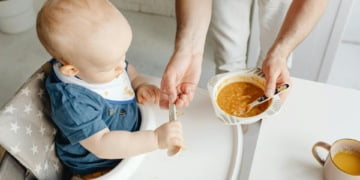Key Notes
- Paced bottle feeding helps to control the amount of milk baby takes in
- It can also help baby sleep better through the night without waking up hungry
- Paced bottle feeding can also help baby to learn how to control their own feeding pace
- It can enable easy switching between the bottle and breast
- Paced bottle feeding can also help your baby develop healthy eating habits
This method has some surprising benefits for both you and your baby! In this blog post, we will discuss what paced bottle feeding is and why it is so beneficial for newborns.
What is Paced Bottle Feeding?
Paced bottle feeding is a method of bottle feeding where you control the flow of milk by using a paced nipple. This allows you to control how much milk your baby takes in and also makes it easier for them to swallow.
Benefits of Paced Bottle Feeding Your Newborn
There are many benefits to paced bottle feeding, both for you and your baby. Some of them include:
1. Helps Reduce Gas and Colic Symptoms in Newborn Babies
Paced bottle feeding can help reduce gas and colic symptoms in newborn babies. This is because it allows them to control the amount of air they take in while drinking from the bottle. It also helps them to swallow less air. It has been shown to be particularly effective in reducing colic symptoms at night.
2. Helps You Bond with Your Baby
Paced bottle feeding also provides an opportunity for you to bond with your baby. This is because you are able to hold and cuddle them while they feed. Additionally, it gives you a chance to talk to them and make eye contact. This can help to strengthen the bond between you and your baby.
3. Make Bottle Feeding Easier
Paced bottle feeding can also make bottle feeding easier for both you and your baby. This is because it allows your baby to control the flow of milk, which makes it less likely that they will choke or gag. It also helps them to take in more milk at a time, which means they will not have to be fed as often.
4. Eases digestion
Paced bottle feeding can also help to ease digestion in newborn babies. This is because it helps them to take in smaller amounts of milk at a time, which reduces the amount of work their digestive system has to do. It also helps to keep their stomachs from getting too full.
5. Reduces Stomach Related Issues
Paced bottle feeding can also reduce stomach related issues in newborn babies. This is because it helps to keep their stomachs from getting too full. Additionally, it helps to ease digestion and reduce gas and colic symptoms. It has also been shown to reduce the risk of developing gastro esophageal reflux disease (GERD).
6. Helps Baby Sleep Better
Paced bottle feeding can also help baby sleep better. This is because it allows them to take in more milk at a time, which can help them to feel full and satisfied. This can help them to sleep through the night without waking up hungry. This is particularly beneficial for newborns who are struggling to sleep through the night.
7. Helps baby to learn how to control their own feeding pace
Paced bottle feeding can also help baby to learn how to control their own feeding pace. This can help them to learn how to eat when they are hungry and stop when they are full.
8. It Enables Easy Switching Between the Bottle and Breast
Paced bottle feeding can also enable easy switching between the bottle and breast. It also helps them to take in more milk at a time, which means they will not have to be fed as often.
9. It Can Help Your Baby Develop Healthy Eating Habits
Paced bottle feeding can also help your baby develop healthy eating habits. This is because it helps them to control the amount of milk they take in, which teaches them how to eat when they are hungry and stop when they are full. Additionally, it helps them to learn how to swallow properly.
10. It Reduces the Risk of Obesity in Later Life
Paced bottle feeding can also reduce the risk of obesity in later life. Additionally, it helps them to learn how to swallow properly. It also helps to reduce the amount of air they take in while drinking from the bottle, which can help to prevent overeating.
11. It Can Help Reduce the Risk of SIDS
Paced bottle feeding can also help reduce the risk of SIDS. This is because it helps to control the amount of air they take in while drinking from the bottle.
As you can see, there are many benefits to paced bottle feeding. It can help you to form a stronger bond with your baby, make bottle feeding easier, reduce stomach related issues, help baby sleep better, and help your baby develop healthy eating habits. It can also reduce the risk of obesity in later life and SIDS. If you are looking for a way to improve your newborn’s feeding experience, paced bottle feeding may be the answer.

























